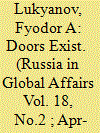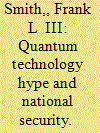|
|
|
Sort Order |
|
|
|
Items / Page
|
|
|
|
|
|
|
| Srl | Item |
| 1 |
ID:
182634


|
|
|
|
|
| Summary/Abstract |
China has prioritized quantum science and technology as a critical frontier for its national security and development. To date, Chinese research has already reached a leading position within the discipline, enabled by state support and funding, as well as the recruitment and cultivation of talent. The rapid advances on this front can provide a valuable illustration of the dynamics of China’s evolving innovation ecosystem, including the increased prominence of leading technology companies, and even start-ups, as serious contenders. China’s strategy of military–civil fusion, which aims to create a more integrated ecosystem in science and technology, can contribute to enabling progress in dual-use developments. This case study draws upon the shared framework for this special issue, which provides a method by which to consider the factors that enable defense innovation. Looking forward, these advances could prove consequential for the future strategic balance between China and the United States.
|
|
|
|
|
|
|
|
|
|
|
|
|
|
|
|
| 2 |
ID:
171987


|
|
|
|
|
| Summary/Abstract |
In theory, a fully functional quantum computer could break the cryptographic protocols that underwrite cybersecurity everywhere, which would be disastrous for national security, global trade, and civil society. Quantum cryptography, conversely, promises an unprecedented level of security, yet this benefit comes with some danger: revisionist actors with impenetrable communications might be able to conduct surprise attacks and covert conspiracies. In reality, neither of these threat scenarios are likely. Intelligence advantage in political competition depends on the interaction of technological infrastructure with organizational institutions. Robust cryptosystems can be undermined by poor organizational coordination, and careful security policy can compensate for technical vulnerabilities. Scientific innovation in quantum technology only affects one of these dimensions while potentially complicating the other. Even if the formidable engineering challenges of quantum computing can be overcome, signals intelligence collectors will still have to analyze a vast number of decrypts and deliver timely and relevant judgments to interested decision makers. The quantum networks of tomorrow, similarly, will provide little protection for complex organizations that have weak operations security practices. In the practice of intelligence, we should expect classical politics to dominate quantum computing.
|
|
|
|
|
|
|
|
|
|
|
|
|
|
|
|
| 3 |
ID:
172948


|
|
|
| 4 |
ID:
175133


|
|
|
|
|
| Summary/Abstract |
Technology hype is an important concept in business, marketing, and science and technology studies, but it is rarely related to security studies. What is technology hype? How does it relate to national security? And to what effect? This article examines rational and performative perspectives on technology hype as either a kind of exaggeration or expectant discourse. Adopting the latter view, I compare and contrast hype cycles with threat inflation and securitization theory. I then sketch my own theoretical propositions about technology hype as being common in national security, with variable degrees of acceptance, familiar content, and significant consequences. A case study on quantum technologies provides proof of concept. I find ample evidence of hype over quantum computers, communications, and sensors; audience acceptance in the national security community varies with familiarity; and consequential decisions appear to follow. While cyclical expectations suggest the need for caution when citing quantum technologies in support of quantum approaches to international relations, a middle-range theory about technology hype provides useful insight into security practice.
|
|
|
|
|
|
|
|
|
|
|
|
|
|
|
|
|
|
|
|
|